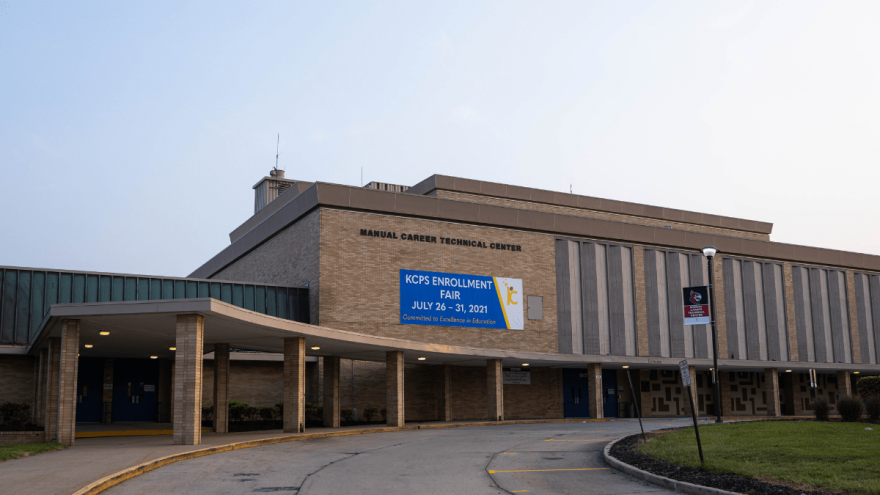As a counselor at Southeast High School in Kansas City, Missouri, Nekita Fuller would encounter students with high GPAs who suddenly started to miss classes or arrive late.
Often, it turned out that the students had taken on jobs to help support their families.
“They were working jobs that maybe released them at 7 in the morning or 9 in the morning, and they were missing class time,” Fuller said.
Southeast would work with students to rearrange classes, develop agreements with teachers or pare down schedules to part time.
But the situation wasn’t ideal. Creating accommodations to meet students’ needs could be tricky. It often still meant students missing school, which affected the school’s attendance records and, consequently, state funding.
So Kansas City Public Schools is launching a new Evening Academy program to make it easier for working students — and others who struggle with a typical 7 a.m. to 2 p.m. schedule — to complete their high school education.
Fuller, who recently became the district’s coordinator of K-12 counseling and student services, thinks the program will be perfect for students who need to balance work and school and who aren’t a good match with the district’s existing options.
Lori Peters, Evening Academy’s coordinator, also has high hopes for the program and how students will react to it.
“I know it’s going to be very successful and they’re going to love it.”
Allowing students to balance work and education
Creating an evening education program has been an idea at KCPS for years, said Christy Harrison, the district’s director of educational innovation.
It has become clear that even the district’s existing alternative programs, like Middle College for students who previously dropped out or Missouri Option for students who have fallen behind their graduating class, weren’t a good fit for everyone, Harrison said. They still operated during normal school hours.
More students have also picked up jobs because of the COVID-19 pandemic, Harrison said.
The program is not a night school for adults or a GED program, but rather it is meant to provide a traditional high school degree to any ninth- to 12th-grade students who would prefer a later schedule. That can include students who dropped out recently and would like to return, but it isn’t limited to those students.
“We know that there are a number of families that really need their high school student to help support them,” Harrison said. “And so to ask a student to choose between, you know, your family and putting food on the table or coming to school, it’s just not something that we want to do.”
Work isn’t the only reason students might be a good fit for the Evening Academy, Fuller said.
Some students with children may find it easier to coordinate care if they can watch their child during the day while another relative takes over at night.
While the district does offer an on-site day care for students with children, that isn’t an acceptable option for all students, including those who come from cultures where it isn’t the norm, Fuller said.
The Evening Academy can also be an opportunity for students who do attend daytime school to pick up extra credits, whether they have fallen behind, want to squeeze in more advanced classes or are trying to graduate early, Harrison said.
She suggested some students who have previously chosen the district’s virtual option for education — such as a ballet dancer who often traveled for competitions — might prefer the Evening Academy as well.
While virtual education works well for some students, some need the additional structure, focus, immediate assistance and interaction with peers that an in-person program can bring, she said.
And while the district has provided laptops and internet hotspots, “there are still dead zones across the city for internet access,” Harrison said.

How the Evening Academy will work
The plan is for the Evening Academy to be supported by federal pandemic relief funds in its initial years. After that money runs out, the district will be able to include Academy students in its attendance tallies and receive state money to support their education as it would for any other student.
It will be held at the Manual Career and Technical Center at 1215 E. Truman Road on weeknights from 4-7 p.m. It launches Aug. 23, the same day the rest of the district starts school.
The district is still recruiting both students and teachers to the program, said Peters, the Academy coordinator.
Harrison expects the program will eventually serve around 150 students at a time.
But since recruitment is just starting, expectations for the coming semester are more modest, around 20-25 students. Peters said the first few students are just starting to enroll.
The program will likely grow by word of mouth as students have success with it, Harrison said. Principals and counselors can recommend it to students.
Since Evening Academy is based around the district’s virtual education program, students won’t be limited in what classes they can take despite the program’s initial small size.
In-person teachers will still provide some instruction and guidance, and students taking specialized subjects, like advanced science, will always be connected to a teacher certified in that area, Harrison said.
Because of the potential for virtual work, there’s also an option for students to attend for part of the week and remotely do the rest of the work, Peters said.
As district students, Evening Academy participants will be eligible for all district services such as meals, transportation and guidance counseling. They will also receive any technology they need to complete the work.
“We’re here to support them, and the educational innovation department’s motto is ‘education without barriers,’” Harrison said. “We’re providing the safety nets for students. Whatever you need, we are going to find a way to make it happen for you, and this is just another one of those opportunities for students.”
This story was originally published on The Beacon.




